Treasures of Dodrazeb: The Origin Key, the first book in my sword-and-science fantasy adventure series, is discounted to only $0.99 through June 1st! It’s for anyone who enjoys history with a dash of fantasy interwoven with compelling mystery. This sweeping adventure chronicles a warrior’s quest for vengeance in an isolated Himalayan kingdom. Confounded by a sly princess desperate to keep her people’s ancient secrets hidden, he must recover a deadly device called the Origin Key before a murderer can use it to conquer and destroy.

Get your e-book copy of Treasures of Dodrazeb: The Origin Key for only $0.99 – but hurry, this price is only good through June 1st!
On a quest for vengeance against a criminal known as the Viper, Prince Rasteem becomes suspicious when his army easily conquers Dodrazeb. Princess Laneffri is desperate to expel the Persian invaders from her kingdom and will stop at nothing to protect its secrets—especially the Origin Key, a powerful, ancient device. When Rasteem learns what the Origin Key can do, he must find a way to make the princess an ally to save both their kingdoms from annihilation.
Like to sample before you purchase?
Try this excerpt! This chapter takes place near the beginning of the book. It tells how Prince Rasteem and Princess Laneffri first meet, neither realizing the other’s true identity.
Mounted troops rode into the valley and squads on foot went door to door inside the massive wall in a meticulous search.
As comfortable in the saddle as he was leading infantry on foot, Rasteem sat astride Kurush, a glossy reddish-brown stallion with black mane and tail. Handlers from the king’s stables had said he was too high-spirited to be a suitable war horse, just like army officers had believed Rasteem was too reckless and temperamental to become a good soldier. Rasteem and Kurush proved them all wrong.
When he was younger, Rasteem’s outbursts often eclipsed his brother Zardegerd’s. Time and tragedy molded Rasteem into a composed and prudent leader who channeled his uncontrollable temper into ferocity in battle. He had turned his impatience into thoughtful awareness.
Most of the time.
Rasteem rode at a slow trot across a somewhat desolate corner of the kingdom. Kamran was on horseback beside him as they approached another dwelling. The other side of the valley was a bright patchwork of trees, verdant fields, and orchards. Farms there were nourished by fresh flowing water from canals and irrigation trenches. This corner of the kingdom was home to scattered goat and sheep herders. Their livestock grazed on the scant vegetation in the rocky hills. Streams and smaller brooks brought water from the valley’s winding river, but shade was scarce.
At the first dwelling they visited, an old man and woman cringed and wailed while two soldiers kept them corralled with drawn swords and menacing expressions. Rasteem and Kamran went inside, watching as soldiers rifled through the two-room, thatch-roofed hut. What they found inside surprised Rasteem. He ordered his men to be quick and thorough, respectful of the peasants’ meager possessions.
He saw flagstone floors instead of hard, packed earth. There were stacks of glazed ceramic dishes and metal serving utensils, not crude wooden bowls and spoons. Cupboards and chests stored clothing and belongings. The outbuildings were also neat and tidy. Stalls and fodder for the animals, feed for chickens pecking at the hard ground, stacks of raw wool, and farm tools didn’t interest the prince.
The soldiers found nothing suspicious in the hut or the outbuilding. They headed for the next dwelling and found the same type of clean, orderly home. The shrill cries of a woman and two young boys accompanied the search there. To Rasteem’s relief, the third house they visited was empty, long abandoned.
He decided to split his squad and send the men in pairs so they could search faster. He and Kamran headed for the next nearest cottage. They were back in their saddles when a loud rumbling came from the boy’s direction. Rasteem looked at him.
“I’m hungry.” Kamran complained. “I should have raided the larder at that first house.”
Rasteem chuckled. “That bottomless pit of a stomach will betray you one day when you need stealth and silence—like it did on our last hunt. Remember?”
“I would have killed that panther! It would have been my second, one more than Tujee.” Kamran and Zardegerd’s second son were friendly rivals, always trying to surpass each other. Tujee had gone into battle once, but Kamran had earned bragging rights by killing an enemy in his first experience with war. If Tujee hadn’t sprained his ankle during Rasteem’s training session, he would have been in Dodrazeb with Zardegerd and Kamran would have stayed in Argakest.
Kamran became thoughtful. “Why is Uncle Zardegerd convinced Chudreev the Viper is from here? Why doesn’t he listen to you?”
“Because the only Chudreev we could discover, the only one anyone had ever heard of is the king of this valley.”
“But… it was you… you’re better…,” Kamran stammered. “You tracked Grandfather’s attackers and found Dodrazeb.”
Rasteem blew out a long, slow breath. “Zardegerd commands the army while Father cannot. We take our orders from him.” His eyes narrowed. “Zardegerd will be the King of Kings one day, sitting on the Throne of Light—I only offer advice. It is our place to be warriors always loyal to the rightful king.”
“I know—I don’t mean—it’s just that—” Rasteem waited for Kamran’s thoughts to catch up to his mouth. “He usually listens to you.”
“He’s right about one thing. We must find and dispatch the murderers’ leader. We can’t tolerate incursions into the Empire that threaten the king’s life.”
“So the most likely explanation is that this Chudreev is the one.” Kamran was still curious. “Why do you think it might not be him?”
“These Dodrazebbians are not warlike, weren’t prepared for our assault. They don’t dress like the marauders who attacked Father, and they use different weapons. The vandals are shorter and darker, more like the nomads who plague the Empire’s northern provinces.”
Kamran paid sober attention to the lesson. “You didn’t expect to find Chudreev Pranaga here even before our attack?”
“I thought we might find a king named Chudreev—just not one stupid enough to orchestrate an attack on Father,” Rasteem explained. “I’m not convinced the Chudreev of Dodrazeb is the right one. But Zardegerd is. So here we are.”
Brilliant sunshine beat down on them. Rasteem and Kamran slowed their horses to a walk as they neared the next deserted-looking cottage. The back of the dwelling and the dilapidated outbuilding next to it abutted a steep, rocky outcropping dotted with brambles and sparse tufts of vegetation. Its thatched roof needed repair. A crooked door dangled from a loose hinge.
A broad, shallow stream flowed past a cluster of trees near the house and meandered beyond it. The trees beckoned passersby to enjoy a respite from the heat and dust. Sunlight poured through the branches onto the cool water, making the ripples sparkle.
“It looks empty,” Rasteem observed. “We should keep going.”
“Uncle, aren’t you thirsty?” Kamran asked.
“Roasting inside your armor?” A sly grin tipped up one corner of Rasteem’s mouth.
“Well…” Kamran tried to wipe sweat from his brow, hindered by his helmet.
“All right, then. The horses will be grateful for a drink as well.” Rasteem dismounted and led Kurush to the stream. Alert and watchful, Kamran waited as he had been trained before taking a turn at the water’s edge.
Rasteem knelt, dipped his cupped hand into the stream, and drank a handful of water. He plunged his head beneath the ripples, savoring its bracing coolness. He stood up and flicked wet hair away from his face with a satisfied sigh. Surveying the small house again, he shifted his gaze upward to check the sun’s position. “Come on, boy! Be quick.”
Kamran pulled off his helmet to immerse his sweaty head in the water and enjoyed several greedy gulps. When he was done, he threw his head back and shook his dripping curls. “I wish it was deep enough to—”
Rasteem grabbed his arm and turned him to face the small cottage. “Listen to me, say nothing,” he whispered.
Kamran nodded, wondering why his uncle didn’t want to be overheard by the trees.
“Do you see smoke coming from the chimney?” Rasteem asked.
Kamran squinted at the distant thatched roof and shook his head. The horses took a long drink while the soldiers appeared to be engaged in casual conversation.
“Pay attention. I can smell the fire someone has started in there.”
Kamran sniffed the air and detected a faint aroma that might have been a campfire while he studied the sky above the small dwelling. He watched a few faint gray wisps emerge from its chimney and disperse on the breeze. A small, steadier column of smoke soon diminished to intermittent wisps that faded away. “I see it now!”
Rasteem seized the opportunity to emphasize the importance of strategy. “Does that hovel look inhabited?”
“No,” Kamran whispered.
“Then why is someone lighting a fire? Do you still see smoke?”
“No. They must have put the fire out—someone is hiding in there!” Kamran hissed. “And… and they’ve seen us, but they don’t know if we’ve seen them.”
Rasteem smiled. “Here’s our plan. We will ride toward the place as if we intend to search it. When we get closer, I’ll say it appears to be empty and we should move on. Follow me riding past it and stop when I stop. Understand?”
Baffled, Kamran asked, “Why don’t we just drag them out?”
“If they’ve seen us, they’re prepared for an attack.”
“If they think they haven’t been discovered, their guard will be down.” Excited, Kamran almost forgot to lower his voice.
“Exactly.” His uncle’s approval was worth everything to Kamran.
Rasteem didn’t share his conclusion that only one or two men were hiding, a valuable lesson for Kamran with little risk of injury. He didn’t expect the occupants to put up much of a fight.
Kamran jammed his helmet back on and they mounted their horses. Rasteem led them toward the little dwelling at a trot, stopping on the hard-packed earth outside it. Light did not penetrate beyond the broken dangling door into pitch-black darkness.
“It’s another empty one,” Rasteem announced. He gave the place a bored glance. “I’m ready to get back to camp.”
They rode around the steep hill behind the ramshackle old cottage. They dismounted, approached the barren hillock, and peered around it. There was no sign of activity.
Rasteem whispered, “Stay several paces behind me. When I go through the door, wait outside. If anyone gets past me, stop them.” Kamran’s eyes glittered with excitement.
Rasteem drew his shamshir and took a deep breath. He sprinted toward the side of the hut, confident he could take the occupants by surprise. He knew Kamran could be adept at stealth, appearing from nowhere to defeat his cousins in mock battles.
He signaled Kamran. With a burst of speed, he hurtled toward the doorway. The boy followed, sword drawn, hanging back as ordered. Rasteem tore the rickety door from its one loose hinge and launched himself through it with a roar.
Rasteem surveyed the dark interior as his cry swelled. Trying to take in every detail at once, he missed one crucial item: a thin rope stretched across the doorway at ankle height.
The trip wire sent Rasteem crashing toward the floor. A shrill scream echoing inside his skull, he twisted and tried to roll onto his back before hitting the dusty flagstones. Something heavy hit him, sending a jolt of pain through his right shoulder blade. The force knocked him forward onto his stomach and sent his sword flying out of his hand.
Angry at failing to anticipate the trap, Rasteem let loose another roar and flipped onto his back. He could just make out a dark, solid shadow framed in the open doorway. Fearing for Kamran’s safety, he kicked out one foot and tripped his adversary. As the shadow started to fall, he sprang up and grabbed for its throat. When sharp teeth clamped onto his outstretched hand he roared again in pain. Something hard struck the back of his head with an explosive crack and enough force to make sparks dance before his eyes.
With deep pain radiating from his thumb and a throbbing lump on his head, Rasteem saw the shadow dissolve into sunlight streaming through the doorway.
He shook his head to clear his vision and heard a gasp. Instinct advising him to duck, he avoided another wallop from a heavy weapon. Rasteem pounced toward the sound and heard Kamran shout outside the hovel. Blaming himself for endangering the boy, unsteady on his feet, the warrior groped in the dark.
Rasteem made contact with a warm body. He closed his fingers around a hank of hair, twisted it, and pulled his assailant toward him. They struggled, high-pitched screams overlapping his grunts. Something heavy clanked against the flagstones. Holding tight to the flailing whirlwind, Rasteem pushed it toward the door. He wanted to continue the fight in sunlight so he could see what had happened to Kamran.
He crossed the threshold onto the hard-baked earth outside. He didn’t see the boy. What he did see made him loosen his grip on his prisoner.
“A woman!”
She preyed on his surprise and wrenched free. She swung around to run away, her long, thick braid of black hair whipping. Rasteem seized the braid with one hand and jerked, bringing her to a dead stop. She screamed again. He grabbed her with his other hand and pulled her to his chest, pinning her hands at her sides. He wrapped the braid several times around his hand and forced her to look up at him. As she wrestled to escape, he saw a mark on her skin behind her left ear resembling a coiled snake. Putting the discovery aside for later, he began an interrogation.
“Who are you? Why are you hiding?” He intended to get answers—by force if necessary. He eyed his captive, trying to understand how a mere woman could have come so close to besting him.
Her long, loose plain muslin tunic and ill-fitting trousers were dirty, the embroidered slippers on her feet tattered and muddy. Under streaks of grime and soot, her face twisted into a snarl, exposing pearl-white teeth. Rasteem had no desire to feel how sharp they were.
“Barbarian devil!” she hissed. The metal scales on Rasteem’s armor tore at the thin fabric of her tunic, pressing into her flesh as she writhed.
“Kamran!” He yelled, trying to look in all directions at once. He spotted the boy’s shamshir in the dirt between the hovel and its dilapidated shed. Cold dread returned.
“How many of you are there?” He jerked the braid still wound around his hand. She cried out again and stared at him with raw hatred, her dark eyes glistening. He felt her heart beating against her ribs, sure it was more from struggling against him than from fear. Rasteem had the feeling she was every bit as dangerous as any lion he had ever cornered in a hunt.
“What will you do with Dodrazeb now?” she demanded.
Astonished by her insolence, he scowled. “The same thing I’ll do with you—whatever I please.” Looking for any sign of Kamran, Rasteem spat out, “If he is harmed, I swear I will—”
“You will what?” A sneer twisted her mouth. Before Rasteem could decide her punishment, they both heard a loud groan. It came from somewhere near the small ramshackle outbuilding.
“Kamran!” Rasteem pulled the woman with him toward the sound.
A helmet rose from behind a pile of debris crowned by a broken stool. Vulnerable without his sword—it still rested where he had dropped it in the hovel—Rasteem braced for another attack until Kamran’s face was visible beneath the helmet. Rubbing the back of his neck, the boy came to his feet.
Kamran took a halting step toward Rasteem and his prisoner. “I wasn’t expecting a wo–”
“Behind you!” Rasteem saw movement in the shed.
The second of distraction was all the prisoner needed. She yanked her braid from his hand and pushed against his chest to get away.
As the woman made her move, a screaming girl in threadbare, dirty clothes burst out of the shed, hands clamped around a rusty pitchfork raised over her head. Rasteem grabbed his prisoner’s arm before she could escape and Kamran avoided the pitchfork’s sharp tines at the last moment. He sprang aside, tripped over an old bucket, and fell face-first on the ground.
Rasteem’s prisoner pulled her right leg back and kicked hard, smashing her knee into his crotch. His face contorted, he let her go and grabbed his groin, reeling, unable to make a coherent sound. Eyes rolling up into his head, he dropped to his knees and fell over sideways.
The woman bolted toward the girl, shouting in a language the soldiers didn’t understand. She dragged her accomplice into the shed without looking back. Kamran scrambled to his feet and recovered his shamshir, intending to give chase. Then he saw his uncle writhing in the dirt.
Rasteem screwed his eyes shut and managed a ragged breath. Incapacitated by the unbearable, radiating pain from the woman’s blow, he tried not to whimper.
Kamran ran to his side. “Uncle! Where are you injured? What did she do to you?” The boy’s alarm escalated when Rasteem moaned instead of answering.
“Was it a dagger?” Panicked, Kamran searched for an unseen wound. “Rasteem! What can I do? How can I help you?”
Rasteem managed a tortured whisper. “… let them get away…”
 Treasures of Dodrazeb: The Origin Key is an historical sword-and-science fantasy adventure. Click here to read an excerpt.
Treasures of Dodrazeb: The Origin Key is an historical sword-and-science fantasy adventure. Click here to read an excerpt.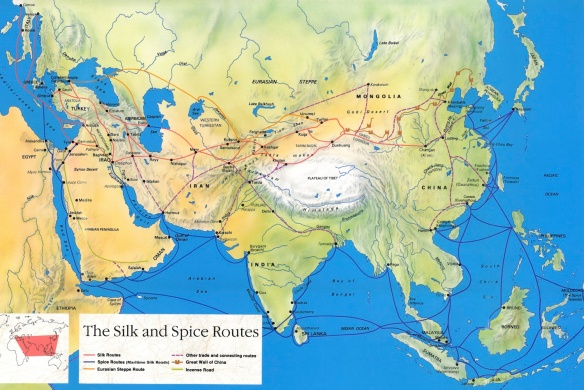 The Chinese began making silk fabrics around the year 2700 BCE. Reserved exclusively for use in their imperial court, methods for creating silk were kept secret for more than 3,000 years. But silks showed up in other parts of the world as the Chinese traded it extensively with their nearest neighbors and used it as diplomatic gifts. Early in the first century BCE, silk became prized in the Roman Empire as a rare and exotic luxury. Trading routes were developed and expanded to move the goods from East to West. From Rome, the desire for silk was introduced to other western cultures.
The Chinese began making silk fabrics around the year 2700 BCE. Reserved exclusively for use in their imperial court, methods for creating silk were kept secret for more than 3,000 years. But silks showed up in other parts of the world as the Chinese traded it extensively with their nearest neighbors and used it as diplomatic gifts. Early in the first century BCE, silk became prized in the Roman Empire as a rare and exotic luxury. Trading routes were developed and expanded to move the goods from East to West. From Rome, the desire for silk was introduced to other western cultures. Much more was exchanged along the Silk Roads than just sought after trade goods. The trade routes connected major cities and civilizations, making cultural interaction necessary. Languages and customs were understood and adopted to make buying and selling possible. Religions and cultures developed and influenced each other because knowledge about science, arts, literature, crafts, and technologies was shared across the Silk Roads. By the way, scientists and historians now widely believe that the route was a primary way that the Black Death plague bacteria moved westward into Europe.
Much more was exchanged along the Silk Roads than just sought after trade goods. The trade routes connected major cities and civilizations, making cultural interaction necessary. Languages and customs were understood and adopted to make buying and selling possible. Religions and cultures developed and influenced each other because knowledge about science, arts, literature, crafts, and technologies was shared across the Silk Roads. By the way, scientists and historians now widely believe that the route was a primary way that the Black Death plague bacteria moved westward into Europe. Before the network of Silk Road trading routes, there was the Persian Royal Road which would become one of the main arteries of the Silk Road. Before his death circa 529 BCE, Cyrus the Great had conquered a vast amount of territory, uniting many small and large kingdoms and peoples under his rule. His Achaemenian Empire survived for more than two centuries due to his willingness to support local customs and religions of the people he conquered.
Before the network of Silk Road trading routes, there was the Persian Royal Road which would become one of the main arteries of the Silk Road. Before his death circa 529 BCE, Cyrus the Great had conquered a vast amount of territory, uniting many small and large kingdoms and peoples under his rule. His Achaemenian Empire survived for more than two centuries due to his willingness to support local customs and religions of the people he conquered.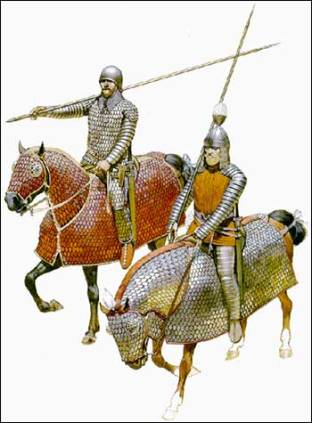 The Persian Royal Road ran from Susa, in north Persia (modern Iran) to the Mediterranean Sea in Asia Minor (modern Turkey) a distance of more than 1,600 miles. The postal stations at regular intervals along the route provided fresh horses for envoys to quickly deliver messages throughout the empire and inspired the famous line “Neither snow nor rain nor heat nor gloom of night stays these couriers from the swift completion of their appointed rounds.” (see my post Ancient Persia’s Pony Express) Relay messengers could traverse the entire road in a mere nine days, sometimes only seven or eight. Normal travel time for caravans or casual travelers was about three months.
The Persian Royal Road ran from Susa, in north Persia (modern Iran) to the Mediterranean Sea in Asia Minor (modern Turkey) a distance of more than 1,600 miles. The postal stations at regular intervals along the route provided fresh horses for envoys to quickly deliver messages throughout the empire and inspired the famous line “Neither snow nor rain nor heat nor gloom of night stays these couriers from the swift completion of their appointed rounds.” (see my post Ancient Persia’s Pony Express) Relay messengers could traverse the entire road in a mere nine days, sometimes only seven or eight. Normal travel time for caravans or casual travelers was about three months.
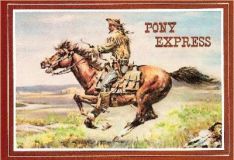 Even though it set speed records for mail delivery and became a well-loved and thoroughly romanticized piece of historical lore, the Pony Express was only in operation for 19 months. In that brief time, it failed to secure a lucrative government mail contract and never turned a profit. Between hostile Native Americans and the completion of the transcontinental telegraph system, the Pony Express was driven out of business and became obsolete in October of 1861.
Even though it set speed records for mail delivery and became a well-loved and thoroughly romanticized piece of historical lore, the Pony Express was only in operation for 19 months. In that brief time, it failed to secure a lucrative government mail contract and never turned a profit. Between hostile Native Americans and the completion of the transcontinental telegraph system, the Pony Express was driven out of business and became obsolete in October of 1861. So, just how did that famous phrase come to be associated with the U.S. Postal Service? The unofficial motto is inscribed in granite over the entrance of the James A. Farley building at Eighth Avenue and 33rd Street in New York City, right in the middle of Manhattan. Back in the early twentieth century, the architectural firm of McKim, Mead & White was chosen to design the New York General Post Office building. Construction began in 1912 and it was opened to the public in 1914. The building was doubled in size in 1934 and its name was changed to honor Postmaster General James A. Farley.
So, just how did that famous phrase come to be associated with the U.S. Postal Service? The unofficial motto is inscribed in granite over the entrance of the James A. Farley building at Eighth Avenue and 33rd Street in New York City, right in the middle of Manhattan. Back in the early twentieth century, the architectural firm of McKim, Mead & White was chosen to design the New York General Post Office building. Construction began in 1912 and it was opened to the public in 1914. The building was doubled in size in 1934 and its name was changed to honor Postmaster General James A. Farley.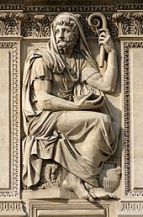 William Mitchell Kendall was one of the architects. Kendall, who frequently read classic Greek literature for pleasure, had grown up in a wealthy household with a father who was a scholar of the classics. He selected a passage (translated by Professor George Herbert Palmer of Harvard University) from book 8, paragraph 98, of The Persian Wars by the ancient Greek historian Herodotus (c 484–c 425 BCE). The Post Office Department agreed that Kendall’s slight modification of the original translation was suitable for the building, and approved it.
William Mitchell Kendall was one of the architects. Kendall, who frequently read classic Greek literature for pleasure, had grown up in a wealthy household with a father who was a scholar of the classics. He selected a passage (translated by Professor George Herbert Palmer of Harvard University) from book 8, paragraph 98, of The Persian Wars by the ancient Greek historian Herodotus (c 484–c 425 BCE). The Post Office Department agreed that Kendall’s slight modification of the original translation was suitable for the building, and approved it. The fact is, flat bread served with toppings has been around for millennia. The addition of tomato sauce is a modern variation. For this discussion, let’s broadly define pizza—or the ancient ancestor of modern-day pizza—as a flat bread with toppings. Who invented that? Ancient Persians, that’s who!
The fact is, flat bread served with toppings has been around for millennia. The addition of tomato sauce is a modern variation. For this discussion, let’s broadly define pizza—or the ancient ancestor of modern-day pizza—as a flat bread with toppings. Who invented that? Ancient Persians, that’s who! That’s right, way back in the sixth century BCE, warriors in the armies of Persian King Darius I turned their battle shields horizontal and heated them to bake flat bread that they then covered in cheese and dates. “But,” I can hear you mumbling, “dates don’t belong on pizza! Dates are a weird fruit that come from palm trees. Anything with dates on it can’t be pizza!” Oh, really? Personally, I don’t think pineapple—ewww!—should ever be considered a pizza topping, even in an emergency. Pineapples are a weird fruit native to South America that were spread to Europe by Spanish explorers in the 1500’s. Anyway, my point is that particular toppings are a matter of taste.
That’s right, way back in the sixth century BCE, warriors in the armies of Persian King Darius I turned their battle shields horizontal and heated them to bake flat bread that they then covered in cheese and dates. “But,” I can hear you mumbling, “dates don’t belong on pizza! Dates are a weird fruit that come from palm trees. Anything with dates on it can’t be pizza!” Oh, really? Personally, I don’t think pineapple—ewww!—should ever be considered a pizza topping, even in an emergency. Pineapples are a weird fruit native to South America that were spread to Europe by Spanish explorers in the 1500’s. Anyway, my point is that particular toppings are a matter of taste. Most people assume the Romans must have invented pizza because the modern version we crave came from Italy. Remember Persian King Darius I and his troops who used their shields to make that ancient version of pizza? Generally speaking, soldiers won’t pass up an opportunity to devour a good, hot meal back at camp after a long, hard day of slicing and dicing the enemy. Well, the Persian Empire didn’t get to be the Persian Empire without fighting a lot of wars with its neighbors, and even some of the Greek city-states were Persia’s allies when they weren’t its enemies. So it’s easy to understand how the idea of cooking bread, cheese, and toppings was spread through the region by soldiers.
Most people assume the Romans must have invented pizza because the modern version we crave came from Italy. Remember Persian King Darius I and his troops who used their shields to make that ancient version of pizza? Generally speaking, soldiers won’t pass up an opportunity to devour a good, hot meal back at camp after a long, hard day of slicing and dicing the enemy. Well, the Persian Empire didn’t get to be the Persian Empire without fighting a lot of wars with its neighbors, and even some of the Greek city-states were Persia’s allies when they weren’t its enemies. So it’s easy to understand how the idea of cooking bread, cheese, and toppings was spread through the region by soldiers. I hear you saying, “But pizza is Italian!” Yes, the Romans were great assimilators. When they saw something they liked, they replicated it and incorporated it into their own culture, just like every culture since the dawn of mankind. However, it takes some things longer to be accepted than others. Take tomatoes, a somewhat weird fruit, by the way, discovered in the Americas. Tomatoes were introduced to Italy in the 16th century, but were widely thought to be poisonous. In fact, when highly acidic tomatoes were served on pewter plates used by many wealthier Europeans, lead would leach from the plate into their food. Rich Europeans died from lead poisoning, but the tomatoes were blamed. Poor Italian folk who fed their families with basic staples such as flour, olive oil, lard, cheese, and herbs couldn’t afford pewter plates, but they ate tomatoes with no deadly consequences. What we immediately recognize today as a pizza originated in Naples, Italy as a cheap meal for the lower classes.
I hear you saying, “But pizza is Italian!” Yes, the Romans were great assimilators. When they saw something they liked, they replicated it and incorporated it into their own culture, just like every culture since the dawn of mankind. However, it takes some things longer to be accepted than others. Take tomatoes, a somewhat weird fruit, by the way, discovered in the Americas. Tomatoes were introduced to Italy in the 16th century, but were widely thought to be poisonous. In fact, when highly acidic tomatoes were served on pewter plates used by many wealthier Europeans, lead would leach from the plate into their food. Rich Europeans died from lead poisoning, but the tomatoes were blamed. Poor Italian folk who fed their families with basic staples such as flour, olive oil, lard, cheese, and herbs couldn’t afford pewter plates, but they ate tomatoes with no deadly consequences. What we immediately recognize today as a pizza originated in Naples, Italy as a cheap meal for the lower classes. So there you have it. Poor Italians added a layer of tomato sauce to the bread before covering it with mozzarella cheese and other toppings. By the way, real mozzarella cheese was originally made from the milk of water buffalo. Water buffalo were brought to Italy by Hannibal, or maybe they came with Arab invaders, or perhaps were imported from India…
So there you have it. Poor Italians added a layer of tomato sauce to the bread before covering it with mozzarella cheese and other toppings. By the way, real mozzarella cheese was originally made from the milk of water buffalo. Water buffalo were brought to Italy by Hannibal, or maybe they came with Arab invaders, or perhaps were imported from India…
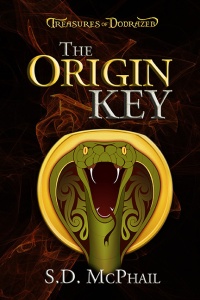



 According to Sports and Games of Medieval Cultures (2002) by Sally E. D. Wilkins, nardshir was the Persian version of a game that dates back to the time of the Pharaohs. Two players sat opposite each other and moved their pieces in opposite directions around the board. The board had four quadrants, each with six lines or points, usually long triangles. Each player had fifteen pieces, either light or dark colored disks. The object of the game was to remove the pieces from the board, known as “bearing off,” while preventing one’s opponent from doing the same. The first to remove all fifteen pieces was the winner. No pieces could be taken off the board until all of a player’s pieces were in the home quadrant.
According to Sports and Games of Medieval Cultures (2002) by Sally E. D. Wilkins, nardshir was the Persian version of a game that dates back to the time of the Pharaohs. Two players sat opposite each other and moved their pieces in opposite directions around the board. The board had four quadrants, each with six lines or points, usually long triangles. Each player had fifteen pieces, either light or dark colored disks. The object of the game was to remove the pieces from the board, known as “bearing off,” while preventing one’s opponent from doing the same. The first to remove all fifteen pieces was the winner. No pieces could be taken off the board until all of a player’s pieces were in the home quadrant.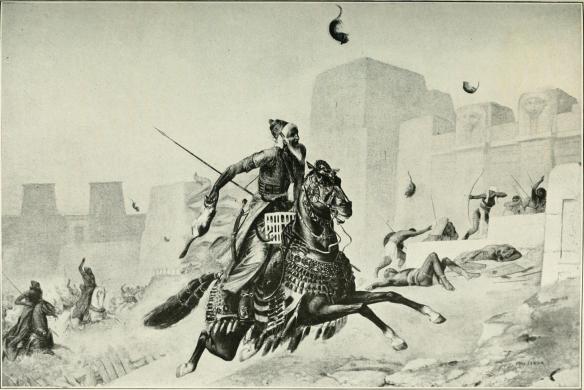


 In my sword-and-science fantasy novel The Origin Key, a third-century Persian prince discovers an incredibly ancient society with surprisingly modern science and technology. The prince is not amused when he is told that the revered Persian ruler Cyrus the Great created the Persian Empire with help and advice from Dodrazeb. In the story, Dodrazeb is a fictional kingdom that originated virtually every scientific advancement known to 21st century mankind—plus some still unknown to us.
In my sword-and-science fantasy novel The Origin Key, a third-century Persian prince discovers an incredibly ancient society with surprisingly modern science and technology. The prince is not amused when he is told that the revered Persian ruler Cyrus the Great created the Persian Empire with help and advice from Dodrazeb. In the story, Dodrazeb is a fictional kingdom that originated virtually every scientific advancement known to 21st century mankind—plus some still unknown to us.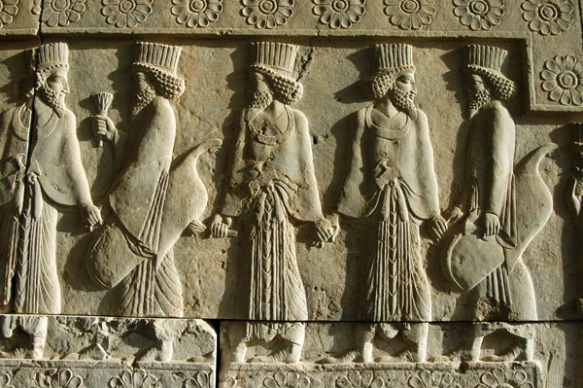
 The
The  The earliest known
The earliest known  Ancient Persians developed ingenious
Ancient Persians developed ingenious  Persians invented “
Persians invented “ Trousers
Trousers